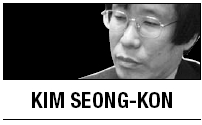In Korea you can easily find nice and warm-hearted people who are generous and trustworthy. In today’s Korean society, however, you may also come across three types of people: the silly, the sly, and the ugly. As for me, I have always been hopelessly silly. When I was awarded a Fulbright scholarship for my graduate study in the United States in 1978, South Korea was not as affluent as it is today. In those days, therefore, the Korean government did not allow a J-1 Visa holder to carry more than $1,000. As the Fulbright

Commission already gave me $40 for minor travel expenses, I exchanged only $960 at the bank and brought it to the United States, faithfully following the rules. When I arrived at my American university and told the story to my Korean colleagues, they all burst into laughter. “You’re so stupidly honest,” they derided me for my silliness and naivet. “We exchanged $3,000 in the black market. And you brought only $960?”
In 1990, when I went to the United States again, the maximum amount of money one could carry into the States at that time was $10,000. So I exchanged the right amount at the bank. But I happened to have a $100 bill which was leftover from my previous trip. So when filling out the U.S. Customs report on the plane, I wrote down I had $10,100. When I arrived at Kennedy airport, I was sent to an inspection officer. “Are you carrying more than $10,000?” roared the customs officer with a suspicious glance. “Yes, $10,100,” answered I. “Only a $100 more?” Surprised, the customs officer said, “Nobody would report that they’re $100 over the limit. You’re all right. You can go.” Hearing my silly adventure at Kennedy airport, my friends laughed at me once again.
You may also come across some sly people who think of themselves as clever. A few weeks ago, a friend of mine was asked to join a presidential committee. His colleagues immediately advised him not to join the committee. The reason was simple: “The president is a lame duck now,” they warned. “Smart people are starting to ebb out of presidential committees so they can be invited to participate by the next administration. And you’re going to join the diminishing power now? Don’t be silly, it’s political suicide.”
Interestingly, few people seemed to realize that those who leave presidential committees for future political gain are opportunistic and sly. Instead, however, they are called “smart” in our society. If my friend joined the presidential committee now, therefore, he would be a moron. But what would happen to our country if we abandoned the current administration a whole two years before the next election simply for such selfish reasons? But those “smart” people could not care less; all they care about is gaining personal political power.
Other “smart” people like to hide behind a crowd. Psychologists assert that Koreans generally tend to hide behind a group or a faction when debating or arguing about something. That explains why in Korean society many conflicts arise not between individuals, but between groups and factions. Indeed, many Koreans want to hide behind their political ideologies or social classes where they do not need to assume responsibilities for their actions.
Perhaps the “hiding behind anonymity” psychology explains why the Korean people enjoy the internet so much; on the internet you can hide your identity and express yourself freely, without having to take responsibility for your criticisms towards others. The same psychology may be related to the enormous popularity of the masked theater during the Joseon Dynasty, in which you were allowed to freely criticize and satirize others behind the mask.
In our society there are those whom you may find ugly. Ugly are those who do not listen to others and raise their voices to intimidate them instead, and who stubbornly refuse to change. Some people cannot acknowledge their mistakes even though they know they are wrong. Our leftist activists, for example, refuse to accept the fact that Marxism has failed. They still try to brainwash others with the obsolete ideology, as if it is a gospel that will save us from evil. In “Black Skin, White Mask,” Frantz Fanon wrote an insightful passage about such people: “Some people hold a core belief that is very strong. When they are presented with evidence that works against that belief, the new evidence cannot be accepted. It would create a feeling that is extremely uncomfortable, called cognitive dissonance. And because it is so important to protect the core belief, they will rationalize, ignore and even deny anything that doesn’t fit in with the core belief.” Fanon seems to believe that those who can change, listen to others, and admit their follies are beautiful.
“The silly” seems better than “the sly” and “he sly” better than “the ugly.” Yet we need to build a society full of the good, the faithful, and the beautiful instead.
By Kim Seong-kon
Kim Seong-kon, a professor of English at Seoul National University, is editor of the literary quarterly “21st Century Literature.” ― Ed.






![[Exclusive] Hyundai Mobis eyes closer ties with BYD](http://res.heraldm.com/phpwas/restmb_idxmake.php?idx=644&simg=/content/image/2024/11/25/20241125050044_0.jpg)
![[Herald Interview] 'Trump will use tariffs as first line of defense for American manufacturing'](http://res.heraldm.com/phpwas/restmb_idxmake.php?idx=644&simg=/content/image/2024/11/26/20241126050017_0.jpg)
![[Herald Review] 'Gangnam B-Side' combines social realism with masterful suspense, performance](http://res.heraldm.com/phpwas/restmb_idxmake.php?idx=644&simg=/content/image/2024/11/25/20241125050072_0.jpg)